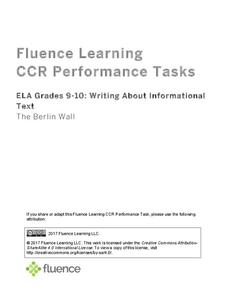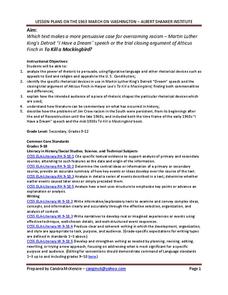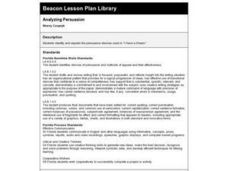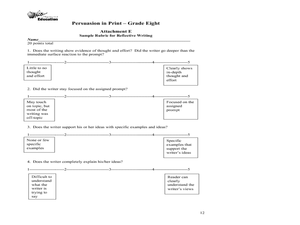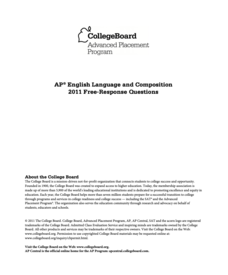Fluence Learning
Writing About Informational Text The Berlin Wall
On June 26, 1963 President John F. Kennedy delivered his famous "Ich bin ein Berliner" speech close to the Berlin Wall at the Rudolph Wilde Platz. On June 12, 1987 President Ronald Reagan Delivered his famous "Mr. Gorbachev, tear down...
Literacy Design Collaborative
Elie Wiesel's Acceptance Speech Analysis
Elie Wiesel's Nobel Prize Acceptance speech provides young historians with an opportunity to demonstrate their ability to use evidence from the speech. They work together to analyze how Wiesel uses rhetorical devices and syntax to...
Curated OER
Rhetorical Devices
Twelfth graders identify and analyze examples of rhetorical devices as valid or invalid inferences. In this text analysis lesson, 12th graders research a controversial topic in teams and identify rhetorical devices for the topic....
Albert Shanker Institute
Making the Case for Equality: A Comparison
Martin Luther King Jr's " I Have a Dream" speech and Atticus Finch's closing argument during the trial of Tom Robinson both address the societal need to overcome racism. After examining the rhetorical devices and figurative language used...
California Federation of Chaparral Poets, Inc
Poetic Devices
Have everything you need to know about the elements of poetry with a nine-page handout. Split into four categories—word sounds, meanings, arrangement, and imagery—budding poets may reference terms, read definitions, descriptions, and...
Curated OER
Analyzing Persuasion
A reading of Dr. Martin Luther King Jr.'s "I Have a Dream" speech launches a study of rhetorical devices such as hyperbole, allusion, metaphor, simile, personification, connotative language and parallel structure. Class members then...
Aurora City School District
Do Not Try to Kid a Kidder: The Art of Persuasion
The power to convince others of your argument lies in your knowledge of rhetoric! A thorough packet covers the basics of persuasion, including logical appeals and fallacies, and applies strategies to letters to the editor,...
Curated OER
Charles Darwin Meets John Paul II
If you teach AP English language and composition and are looking for a way to address the differences between written and spoken arguments, consider this instructional activity. Over the course of three days, class members research...
Curated OER
Eloquent Words
Logan’s Lament, a speech delivered by Mingo Chief Logan in 1774, provides pupils with an opportunity to not only study the historical events surrounding the battle between Native Americans and the Europeans for the West Virginia...
K20 LEARN
The Power of Poetry: Perspectives in Poetry
What do Abraham Lincoln, Dr. Martin Luther King, Jr., and Amanda Gordon have in common? They all believe in the power of words—the power of words to create change. After analyzing the rhetorical strategies in several poems and speeches,...
Curated OER
Rhetorical Devices
Eleventh graders consider rhetorical devices in speeches and then make an informed selection of effective rhetorical devices for a controversial topic presentation. Students present their findings using presentation software.
Curated OER
Persuasion in Print
Advertisers target teenagers. Groups select three magazine advertisements for similar products, analyze the appeals used in each, create a poster that features the persuasive techniques used, and present their findings to the class. The...
Utah Education Network (UEN)
Classical Appeals and War Speeches
Discuss classical appeals of rhetoric through the speeches of Winston Churchill and FDR. Learners read, annotate, and analyze the speeches by the men before using a graphic organizer to track the use of ethos, pathos, and logos.
Prestwick House
The Poetry of Bob Dylan
Bob Dylan's selection as the 2016 winner of the Nobel Prize for Literature, the first songwriter ever to receive the honor, has focused the attention of a new generation on the work of the legendary artist. Class members analyze the...
Deer Valley Unified School District
Close Reading: Analyzing Mood and Tone
The AP Literature and Composition exam is all about close reading. Test takers are presented with a passage and asked to analyze how an author uses literary devices to create a desired effect. Prepare your students for the exam with a...
Scholastic
Persuasive Communication (Grades 9–12)
Before your students reached your morning class to learn about persuasive writing, they probably saw dozens of examples of persuasive communication in the form of advertisements. A short, introductory lesson inspires class members to...
Franklin D. Roosevelt Presidential Library & Museum
Pearl Harbor Activity #2: Why Do Words Matter?
Words matter! That's the big idea behind an activity that asks scholars to replace words in FDR's "Day of Infamy" speech with synonyms. They then listen to a recording of President Roosevelt's address and compare his version to their own.
College Board
2011 AP® English Language and Composition Free-Response Questions
Mammals can be carnivores, omnivores, and herbivores, but what about locavores? A set of free-response questions from the 2011 AP® English Language and Composition exam introduces test-takers to the term, which describes people who try...
Franklin D. Roosevelt Presidential Library & Museum
Pearl Harbor Activity #4: Who is the Audience?
Young historians use the prompts on a worksheet to analyze President Roosevelt's "Day of Infamy" speech. They identify the intended audience for the speech, the devices FDR used to persuade his audience, the responses promoted, and the...
Curated OER
Putting it Together: Analyzing and Producing Persuasive Text
Young orators demonstrate what they have learned about persuasion and persuasive devices throughout the unit by analyzing a persuasive speech and then crafting their persuasive essays. Class members engage in a role-play exercise, use...
K20 LEARN
Say It with Style: Syntax and Parallel Structure
Dr. Martin Luther King, Jr.'s "I Have a Dream" speech provides the text for a lesson that introduces scholars to the significance of syntax. After examining several types of clauses, phrases, and structures, class members use the...
Curated OER
Persuasion Through Rhetoric: Common Devices and Techniques
Context, purpose, and thesis, the three elements of rhetoric, are highlighted in a presentation about persuasive discourse. Designed to accompany a high school or college-level lecture, the resource does provide the necessary basic...
Curated OER
Synecdoche vs. Metonymy: Definitions
Ask your class to lend their ears, and eyes, to a short video that defines and offers examples of synecdoche and metonymy. Whether it be brand names like Kleenex® and Band-aids® that have come to stand for all the products in a category,...
Curated OER
Debates on Persuasive Language That Extend Outside of Class
There is no better sight to see than a classroom full of eager young adults, hands raised high, eager to jump into a class discussion. Get your class identifying and discussing rhetorical strategies and then debating long into the night...
Other popular searches
- Speech Rhetorical Devices
- Rhetorical Devices in Songs
- Rhetorical Devices in 1984
- Rhetorical Devices Dr. King
- Rhetorical Devices Dr King
- Rhetorical Devices Innuendo
- Rhetorical Devices Worksheet


